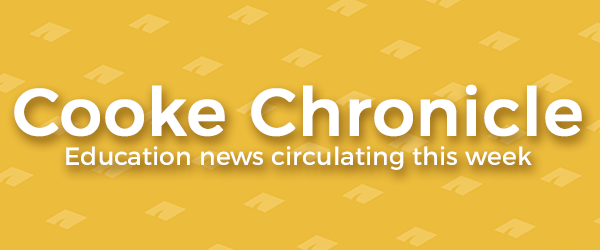Cooke Chronicle: Jan. 20, 2017

Jan. 20, 2017 – Here’s our weekly roundup of education news you may have missed. As the Trump administration takes office, policymakers and education leaders explore new directions for college access and school accountability.
Receive the Cooke Chronicle each week in your inbox. Subscribe here.
Elementary & Secondary Education:
- The Washington Post lists six takeaways from Betsy DeVos’ secretary of education confirmation hearing, including the questioning on using growth vs. proficiency for accountability standards. The 74 Million and the Thomas B. Fordham Institute explain why student growth can be a more equitable measure for high-achieving students from low-income families.
- The Department of Education drops its proposed “supplement not supplant” regulation of the Every Student Succeeds Act (ESSA). Education Week explains that the draft rule “would have pushed for districts and states to make sure they were spending roughly same amount of money—including for teachers’ salaries—in schools that serve a sizeable population of poor students and less-poor schools.”
- New research from the National Association for College Admission Counseling (NACAC) demonstrates that students who met one-on-one with a high school counselor were three times more likely to enroll in college and seven times as likely to complete a FAFSA.
Higher Education:
- At 38 of the nation’s colleges, “more students came from the top 1 percent of the income scale than from the entire bottom 60 percent.” The New York Times additionally details: “Roughly one in four of the richest students attend an elite college … In contrast, less than one-half of 1 percent of children from the bottom fifth of American families attend an elite college; less than half attend any college at all.” These findings are similar to the disparities we noted in our “True Merit” report.
- The Hechinger Report states that college and university meal plans, which can sometimes be mandatory, cost students “70 percent more per day on campus than they would likely pay to cook and eat on their own.”
- Rhode Island Governor Gina M. Raimondo proposes a plan for two tuition-free years for in-state residents attending public higher education institutions. Inside Higher Ed outlines on the plan, which would allow students to choose between having either their first two years at a community college or their second two years at a public university covered.
- Many undocumented students are concerned about their DACA status ending following the inauguration of President Donald Trump. Both National College Access Network (NCAN) and Educators for Fair Consideration (E4FC) provide some advice for students. Diverse: Issues in Higher Education reports on a bipartisan effort moving through Congress that would “give students temporary protection from deportation, and allow work permits to continue without interruption.”
Cooke Foundation Highlights:
- For his latest commentary in The Hill, Executive Director Harold O. Levy describes promising college affordability initiatives for Congress and the incoming administration to consider.
- The Bainbridge Island Review highlights Cooke Young Artist Award winner Charlotte Marckx’s recent win at the Bainbridge Symphony Orchestra’s 2017 Young Artist Concerto Competition.
- Cooke Scholar and Cornell University senior Sagar Chapagain publishes a commentary on the Affordable Care Act (ACA) in the Ithaca Journal.
- Two Cooke Scholars were recently selected for the inaugural Better Make Room Student Advisory Board. Better Make Room shares brief biographies of David Guirgis and Santiago Tobar Potes, and Columbia College has additional details about Santiago.